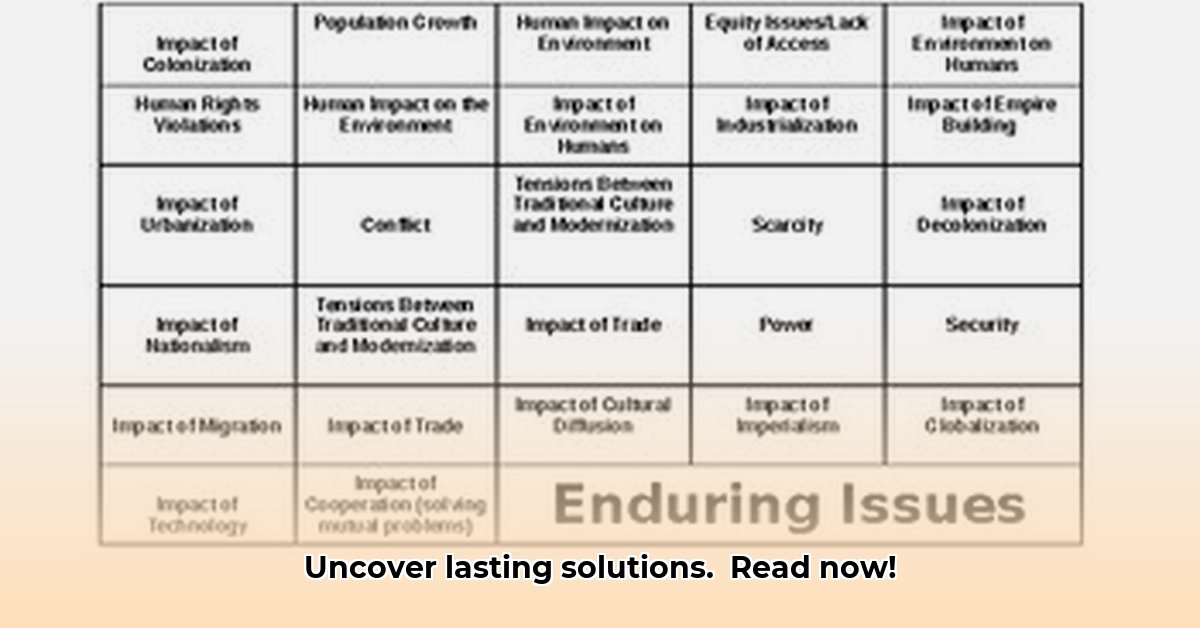The world faces a multitude of persistent, complex challenges – climate change, economic inequality, and political instability, to name a few. These “enduring issues” demand comprehensive understanding and sustained action. This article explores these critical global challenges, examining their root causes, intricate interconnectedness, and potential pathways toward lasting solutions. By analyzing real-world examples, incorporating expert insights, and outlining actionable steps, we aim to empower individuals and organizations to contribute meaningfully to a more just and sustainable world.
Identifying and Understanding Enduring Issues
Enduring issues are persistent problems that affect societies across the globe, often defying easy solutions due to their complexity and interconnectedness. These issues often transcend geographical boundaries and impact multiple facets of human life.
Conflict: Building Bridges for Global Peace
Conflict, a recurring theme throughout human history, manifests in diverse forms, from large-scale wars to localized disputes and disagreements. These conflicts are often fueled by a complex interplay of factors, including resource scarcity, historical grievances, ideological differences, and power imbalances. Understanding these underlying drivers is crucial for effective conflict resolution and the promotion of global security through diplomatic solutions.
Actionable Strategies for Peace:
- Governments: Prioritize investments in peace-building initiatives, focusing on fostering fairness, equity, and inclusive governance.
- International Organizations: Facilitate dialogue between conflicting parties, promoting common ground, mutual understanding, and collaborative problem-solving.
- Individuals: Speak out against injustice, promote empathy and understanding, and support organizations dedicated to peace and reconciliation efforts.
Environmental Degradation: Restoring Our Planet’s Health
Our planet is grappling with a severe environmental crisis characterized by climate change, biodiversity loss, pollution, and resource depletion. These interconnected issues pose a significant threat to the health of ecosystems and the well-being of current and future generations. Ecosystem restoration and a transition to sustainable development practices are essential.
Environmental Action Plan:
| Stakeholder | Immediate Actions (Next Year) | Long-Term Goals (Next 5 Years) |
|---|---|---|
| Governments | Invest in renewable energy infrastructure, implement stricter environmental regulations, incentivize sustainable practices | Achieve significant reductions in greenhouse gas emissions, protect and restore ecosystems, transition to a circular economy |
| Businesses | Reduce waste and pollution, adopt sustainable sourcing and production practices, invest in green technologies | Transform business models to prioritize environmental sustainability, achieve carbon neutrality, promote responsible resource management |
| Individuals | Reduce consumption, conserve energy and water, adopt sustainable transportation options, support environmentally responsible businesses and policies | Integrate eco-friendly choices into daily life, advocate for environmental protection, promote sustainable lifestyles within communities |
Economic Inequality: Bridging the Divide for a More Equitable World
The widening gap between the rich and the poor represents a significant global challenge, contributing to social unrest, limiting economic mobility, and hindering overall societal progress. Addressing this inequality requires a multifaceted approach that includes fair taxation, robust social safety nets, and equitable access to opportunities for all.
Strategies for Economic Equity:
| Stakeholder | Short-Term Steps (Next Year) | Longer-Term Strategies (Next 5 Years) |
|---|---|---|
| Governments | Implement progressive tax policies, strengthen social safety nets, raise minimum wages, expand access to affordable healthcare and education | Invest in education and job training programs, promote affordable housing, address systemic inequalities, foster inclusive economic growth |
| Businesses | Pay fair wages, provide comprehensive benefits, ensure ethical sourcing and supply chain practices, promote diversity and inclusion in the workplace | Implement sustainable business models, prioritize social impact alongside profit, promote equal opportunity for all employees and stakeholders |
| Individuals | Support fair trade initiatives, donate to charitable organizations, advocate for policies that promote economic equality, invest in communities | Promote financial literacy, support local businesses, mentor individuals from disadvantaged backgrounds, advocate for equitable policies |
Political Polarization: Restoring Trust in Democratic Institutions
Increasing political polarization is exacerbating societal divisions, hindering compromise, and eroding trust in democratic institutions. This polarization makes it more difficult to address complex challenges effectively, as even simple issues become political battlegrounds.
Restoring Civil Discourse and Trust:
| Stakeholder | Immediate Actions (Next Year) | Long-Term Goals (Next 5 Years) |
|---|---|---|
| Governments | Promote respectful debate and dialogue, enact campaign finance reform, strengthen ethics regulations, promote transparency in government operations | Reform electoral systems, strengthen democratic institutions, promote civic education, foster media literacy, combat disinformation |
| Media | Prioritize fact-checking and balanced reporting, promote diverse perspectives, avoid sensationalism and inflammatory rhetoric | Develop media literacy programs, promote responsible journalism, combat the spread of misinformation, foster informed public discourse |
| Individuals | Engage in respectful dialogue with those who hold different views, seek out diverse sources of information, participate in civic activities, hold leaders accountable | Promote critical thinking skills, challenge misinformation, advocate for transparency and accountability, support efforts to bridge political divides |
Social Injustice: Advancing Equality and Human Rights for All
Social justice aims to create a world where all individuals enjoy equal rights and opportunities, regardless of race, gender, religion, sexual orientation, or other characteristics. Despite progress, true equality remains elusive, with discrimination and systemic inequalities persisting in many societies.
Strategies for Social Justice:
| Stakeholder | Short-Term Steps (Next Year) | Long-Term Goals (Next 5 Years) |
|---|---|---|
| Governments | Enact and enforce strong anti-discrimination laws, implement inclusive programs and policies, promote diversity and inclusion in government agencies | Invest in programs that promote opportunity for all, address systemic inequalities, promote reconciliation and healing, create a more inclusive and equitable society |
| Organizations | Advocate for policy changes, provide community support services, raise awareness about social justice issues, challenge discriminatory practices | Empower marginalized communities, promote social justice education, foster inclusive leadership, create a more just and equitable world |
| Individuals | Speak out against discrimination, support inclusive initiatives, challenge bias and prejudice, promote understanding and empathy | Strive to create a more inclusive and equitable world, advocate for social justice, support marginalized communities, challenge injustice |
Addressing these complex challenges requires a commitment to understanding, collaboration, and sustained action. By working together, we can build a more just, peaceful, and sustainable world for all.
Collaborative Action: A Pathway to Solving Complex Global Enduring Issues
Key Takeaways:
- Global social issues are deeply interconnected, requiring comprehensive and integrated solutions.
- Effective strategies require collaboration across governments, NGOs, corporations, and individuals.
- Addressing these challenges demands both short-term actions and long-term, sustainable plans.
The Interconnected Web of Global Challenges
Our world faces a complex web of interconnected challenges. Climate change, food insecurity, poverty, and political instability are not isolated issues; they are interwoven threads in a global tapestry. Understanding the interconnectedness of these issues is crucial for developing effective and sustainable solutions. For example, climate change can exacerbate food insecurity, leading to migration and increased inequality. Addressing one challenge often requires addressing others simultaneously.
A Multi-pronged Approach: Roles and Responsibilities
Tackling these complex challenges requires a coordinated effort involving various stakeholders. Each group has unique roles and responsibilities to play:
| Stakeholder Group | Short-Term Actions | Long-Term Strategies |
|---|---|---|
| Governments | Implement targeted social programs, strengthen regulations, provide humanitarian aid, invest in research and development | Develop comprehensive national strategies, foster international collaboration, promote sustainable development, address root causes of conflict and instability |
| NGOs/Civil Society | Advocate for policy changes, provide direct aid to vulnerable populations, raise awareness, promote community empowerment, conduct research | Build capacity, promote awareness, empower communities, foster social innovation, hold governments and corporations accountable |
| Corporations | Adopt sustainable practices, invest in ethical initiatives, promote fair labor practices, reduce environmental impact, support community development | Integrate social impact reporting, promote responsible supply chains, invest in renewable energy, foster innovation for sustainable solutions |
| Individuals | Reduce consumption, conserve resources, support ethical businesses, advocate for change, participate in civic activities, volunteer | Promote sustainable lifestyles, advocate for social justice, support community initiatives, engage in lifelong learning |
Navigating the Nuances: Specific Challenges and Solutions
Examining specific challenges, such as income inequality, reveals that it is not simply a monetary issue but also a matter of access to education, healthcare, and opportunities. Targeted interventions, such as scholarships, job training programs, and affordable healthcare initiatives, can make a significant difference. Similarly, addressing climate change requires technological innovation, changes in consumption patterns, and international agreements. Effective solutions are rarely simple; they require careful consideration of the specific context and the needs of affected communities.
Measuring Success and Adapting Strategies
Progress is not always linear. We need clear metrics to track our impact and regularly evaluate our strategies. Adaptability and a willingness to learn from both successes and failures are essential. By embracing a data-driven approach and remaining flexible, we can continuously refine our efforts and maximize our impact.
Addressing Persistent Economic Disparities in Developing Nations
Key Takeaways:
- The global fight against poverty faces significant
- Borosilicate Glass Containers Offer Superior Food Storage and Meal Prep - January 20, 2026
- Glass Lid Storage Containers Keep Food Fresh and Safe - January 19, 2026
- Borosilicate Glass Storage Delivers Durability and Safety for Meals - January 18, 2026










